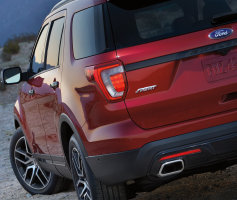
— A Ford Explorer exhaust leak investigation has been closed after federal safety inspectors spent six years searching for safety defects but allegedly finding none.
The National Highway Traffic Safety Administration also determined 2011-2017 Ford Explorers were not producing high carbon monoxide levels in the occupant compartments.
Other than cases where the Explorers were worked on and altered or damaged, NHTSA found carbon monoxide levels, "below current accepted health standards."
The Ford Explorer exhaust leak investigation was opened in 2016 following 154 complaints about exhaust fume leaks in 2011-2015 Ford Explorer SUVs. Explorer owners complained about being sickened by carbon monoxide as attorneys began filing class action lawsuits.
The original investigation of 639,000 model year 2011-2015 Ford Explorers was upgraded in 2017 to more than 1.3 million model year 2011-2017 Ford Explorer consumer SUVs and Explorer Police Interceptors.
During the six-year Ford Explorer exhaust leak investigation, NHTSA "incorporated knowledge and expertise from the automotive, medical, environmental health, and occupational safety fields."
Safety regulators reviewed more than 6,500 complaints about Explorer exhaust leaks and carbon monoxide incidents. The government says it used field inspections and vehicle testing "both independently and in coordination with Ford and other entities."
Ford continued to issue technical service bulletins (TSBs) to dealerships to reduce exhaust leaks and carbon monoxide as owners and police agencies complained about the Explorers.
In addition, Ford announced field service actions (FSAs) for consumer and police Explorers, and NHTSA investigated the TSBs and FSAs.
Federal investigators found problems with how Ford Explorer police vehicles had been upfitted during installation of lights, sirens, cages and other components.
According to NHTSA:
"Sealing issues caused by upfitting were responsible for the highest measured carbon monoxide levels in tested vehicles. Similarly, the highest CO levels measured in consumer vehicles were usually traced to sealing issues caused by rear crash damage where the repairs did not ensure sealing integrity."
The government also found a "substantial reduction" of carbon monoxide levels following Ford's directions to reprogram the heating and cooling systems.
As for Ford Explorers that measured higher carbon monoxide levels:
"Throughout the investigation, vehicles accurately measured with higher levels of carbon monoxide were almost always affected by upfitter alterations, damage, or other causes compromising rear passenger cabin seals." — NHTSA
Safety regulators also say they received "thousands of reports alleging odors which triggered a variety of physiological responses, predominately nausea, headaches, and lightheadedness."
However, investigators say that other than gaps and seal issues caused by damage or work performed on the Explorers, carbon monoxide levels didn't exceed "accepted occupational CO exposure levels."
"This investigation finds that the 2011-2017 Ford Explorer vehicles when accurately measured produce occupant compartment CO levels which fall below current accepted health standards, and could not identify COHB levels for vehicle drivers or other occupants, which exceeded thresholds for acute physiological effects. Therefore, the agency has not identified a defect that represents an unreasonable risk to motor vehicle safety." — NHTSA
Although the results of the six-year federal investigation will be good news to Ford, it won't help with what Ford lost due to individual Explorer exhaust leak lawsuits and class action settlements.
Ford says it agreed to settle exhaust leak and carbon monoxide lawsuits simply to put an end to the litigation.




